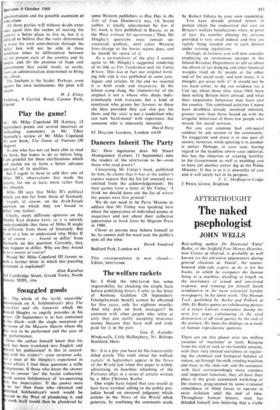Smuggled goods
r: The whole of the 'easily accessible' formation on A. Solzhenitsyn's play The ore-Girl and the Innocent which Mr onald Hingley so angrily provides in his eview (20 September) is in fact contained the blurb—with the single exception of e name of the Moscow theatre where the ay was to be performed and the year of e performance.
Does the author himself know that his ork has been translated into English and ffered for publication? Is this in accord- ce with his wishes?'—your reviewer asks. or a man of Mr Hingley's experience in viet affairs I find these questions a trifle singenuous. If those who know the answer ere to answer 'yes' the Soviet authorities ould accuse Solzhenitsyn of 'co-operating ith the imperialists'. If the answer were be 'no' then those who obtained and Wished Solzhenitsyn's work would be used in the West of plundering it, and work itself would then be plundered by some Western publishers as One Day in the Life of Ivan Denisovich was. (A Soviet author is totally unprotected by law if his work is first published in Russia, or in the West without his agreement.) Thus Mr Hingley's questions must remain un- answered, publicly, until either Western laws change or the Soviet regime does, and he should be aware of it.
As a co-translator of the play I cannot agree to Mr Hingley's suggested rendering of its title as The Tenderfoot and the Camp Whore. This was in fact our original work- ing title and it was published in some cata- logues and articles. In the end we rejected it as both crude and inaccurate. In the labour camp slang, the 'shalashovka' of the original is not a whore who sleeps indis- criminately with everyone, but a kind of courtesan who grants her favours to those she likes provided they can also pay for them, and the 'olen' is not a tenderfoot who can turn 'hard-nosed' with experience, but someone who is inherently innocent.


































 Previous page
Previous page